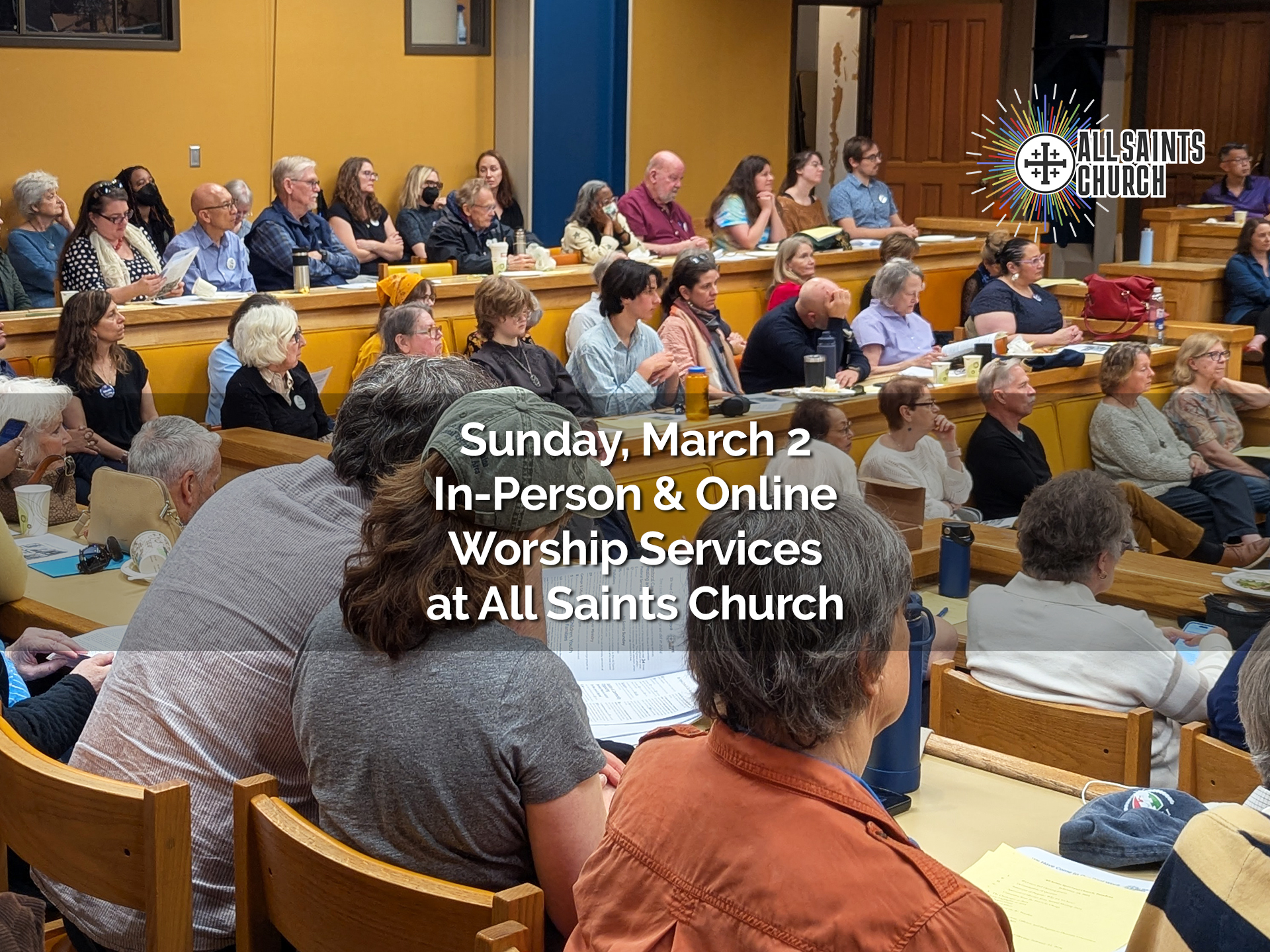by Mike Kinman, Rector of All Saints Church, Pasadena
The gospel isn’t meant to be gulped down on Sunday morning, but gnawed on through the week so it really becomes a part of us. You’ve got to work at it, like a dog with a good bone! Here’s the Gospel for this coming Sunday —the 3rd Sunday After Pentecost— with food for thought on fear, faith and the cost of discipleship … Gnaw away!
Third Sunday after Pentecost: Matthew 10:24-39
Jesus said to the twelve apostles, “A student is not superior to the teacher; the follower is not above the leader. The student should be glad simply to become like the teacher, the follower like the leader. If the head of the house has been called Beelzebul, how much more the members of the household!”
“Don’t let people intimidate you. Nothing is concealed that will not be revealed, and nothing is hidden that will not be made known. What I tell you in darkness, speak in the light. What you hear in private, proclaim from the housetops. Don’t fear those who can deprive the body of life but can’t destroy the soul. Rather, fear the one who can destroy both body and soul in Gehenna. Are not the sparrows sold for pennies. Yet not a single sparrow falls to the ground with your Abba God’s knowledge. As for you, every hair of your head had been counted. So don’t be afraid of anything – you are worth more than an entire flock of sparrows.
“Whoever acknowledges me before others, I will acknowledge before Abba God in heaven. Whoever disowns me before others, I will disown before Abba God in heaven.
“Do not suppose that I came to bring peace on earth. I came not to bring peace, but a sword. I have come to turn
‘A son against his father
a daughter against her mother,
in-law against in-law.
One’s enemies will be the members of one’s own household.
“Those who love mother or father, daughter or son more than me are not worthy of me. Those who will not carry with them the instrument of their own death – following in my footsteps – are not worthy of me. You who have found your life will lose it, and you who lose your life for my sake will find it.”
The Backstory – What’s Going On Here?
We continue with the beginning of the Second Discourse of Matthew’s Gospel. The first discourse is commonly called the Sermon on the Mount and has some of Jesus’ best teachings about discipleship. But the second discourse is where stuff gets real — it’s about taking it to the streets. Last Sunday, we heard the beginning of Chapter 10 (just before this passage). Jesus gives the disciples authority over unclean spirits and to cure sickness … and then he sends them out “as sheep in the midst of wolves.” Yes, they have power, but they also will be at the mercy of the people they meet and will have to trust in God to protect them. And just before the passage we hear on Sunday, Jesus says “When they persecute you….” not if they persecute you, but when. Jesus is sending his troops into battle.
Now, Jesus moves on to different battles. Not being dragged in front of judges but division that cuts much closer to home … in fact, within the home.
A few things to chew on:
Jesus says, “Have no fear.” Comforting words. But then we listen to the rest of what he says: “Do not fear those who kill the body?” Why? Not because they won’t kill your body but because they cannot kill the soul! What he’s saying is … Yeah, they might kill you. But don’t be afraid. Chew on that for a while.
And then his follow up is even more intense — if you really want to be afraid, be afraid of God — who can toast both your soul and body in hell! The disciples are caught between two forces — one that can kill the body and one that can kill the body and soul. Why not be afraid? Because of the way Jesus sums it up — even though you are caught in between these two cosmic powers … even though you are infinitely small by comparison … you are also of infinite value. Even the smallest hair on your head is counted and loved by God. You are being sent into a place that is absolutely out of control, where forces that can kill are exploding all over the place. But have no fear … God is watching …and God knows you are infinitely valuable.
Jesus says: “Whoever acknowledges me before others, I will acknowledge before Abba God in heaven. Whoever disowns me before others, I will disown before Abba God in heaven.”
A few years ago, I sat in the living room of a Palestinian Christian who castigated bishops for their practice of tucking their pectoral crosses in their pocket (and there were two bishops in the room!) saying “Are you ashamed of Jesus?” This is from a man who had been run out of business and had his life threatened because of his boldness about his faith. And that boldness had changed him. C.S. Lewis wrote: “You never know how much you really believe anything until its truth or falsehood becomes a matter of life or death to you.” Following Jesus — and doing it unashamedly — was for him a matter of life and death. That kind of faith changes hearts and changes lives — and clarifies for us what is really important.
We live in a culture where being open about our faith doesn’t risk life or livelihood but instead risks friendships … or just feeling like we’re being annoying. Because there is so much oppression of other faiths done in the name of Jesus, we can desperately want to avoid being a part of that so we don’t proclaim our faith for fear of participating in intolerance. The fear is the same … being set apart and different in a way that will impair relationship. How does your ability publicly to own your faith affect the depth of your faith and it’s impact on your life?
Try This:
A first step when we are in a situation of conflict is to ask ourselves a simple question: “What is my truth?”
Our truth is that “I statement,” about what our experience of truth is. It can be: “I am angry.” or “I feel hurt.” or “I am terrified.” But nobody can argue with it because it’s your truth.
Then the next step is to share that truth with the person you are in conflict with … and invite them to share their truth with you. Then you can address the conflict with a foundation of reality, a foundation of truth.
This week, spend a few minutes at the beginning of each day holding in your heart a relationship that is in conflict. Ask yourself the question: “what is your truth?” Then lift that truth up to God in prayer. Ask God what it would look like for you to tell that truth in the light. Ask God for the courage to tell your truth … and to listen for others’ truths, too.
Write this:
Jesus talks about family conflict – about members of the family being turned against one another because of trust in and loyalty to him.
Is there a deeply held belief that you keep to yourself and from other members of your family out of fear of the division and conflict it would cause to share it? This week in your journaling, write about that belief and why it is important to you. Tell “your truth” about it. Then imagine what it would be like to read that to a member of your family.
Into the light
Sin is like a mushroom. It thrives in the dark. Naming it is the beginning of the light. Naming it out loud is terrifying because it is allowing ourselves to be maximally vulnerable. We can only do that as we trust in God’s love and faithfulness to us. And the greatest instance ever of this maximal vulnerability? Of showing all and telling all? Of being naked and unashamed? That’s the cross. And it’s why the cross is the key to salvation.
Nothing is covered up that will not be uncovered.
Nothing secret that will not become known.
What I say to you in the dark, tell in the light.
What you hear whispered, proclaim from the housetops.
Oh … and when you do it, people are going to get really, really, really mad.
Jesus tells his disciples that they are above all to be truth-tellers and light-bringers. Because sin – all those things that break relationship with ourselves, one another, creation and God — is like a mushroom. It thrives in the dark.
And yet darkness is our preferred storage location for sin — ours and the sin of the world. Because sin’s ugly and seductive cousin is shame. Shame convinces us that we need to cover up our sins … just the way Adam and Eve tried to hide their nakedness from God in the garden. Shame convinces us that truth is never to be shouted, only to be whispered, if it is uttered at all.
What Jesus is inviting us to do is an incredible (and incredibly scary) thing. To name the truth as we see it. Not just … or even primarily … the truth we see about others’ sin. But the truth we know about ourselves.
Jesus is sending us out into a world that is as ravenous as wolves and live transparent lives where we own our mistakes — and even proclaim them from the rooftops. Where we acknowledge the sin of the world because we have acknowledged our own sin first.
Why does Christ call us to this life? Because it is the life of perfect freedom. Because when we speak truth, when we cover nothing up and bring everything into the light, there is nothing anyone can hold over our heads.
And we can follow this life of truth-telling because every hair on our head is numbered. Because we don’t need to fear those who can kill the body but can’t touch the soul. In short, we can be the boldest of truth tellers and we can be killers of shame because we can trust in God’s never-failing love for us.
And because of that love, we can share in the life of Christ. We can approach the cross without fear. We can live in perfect freedom as children of the resurrection.
Check out the rest of Sunday’s readings
The Lectionary Page has all of the readings for this Sunday and every Sunday – click here for this Sunday’s readings.
Collect for Sunday — Pray this throughout the week as you gnaw on this Gospel.
O Lord, make us have perpetual love and reverence for your holy Name, for you never fail to help and govern those whom you have set upon the sure foundation of your lovingkindness; through Jesus Christ our Lord, who lives and reigns with you and the Holy Spirit, one God, for ever and ever. Amen.
Want to read more?
“The Text This Week” is an excellent online resource for anyone who wants to dive more deeply into the scriptures for the week.



